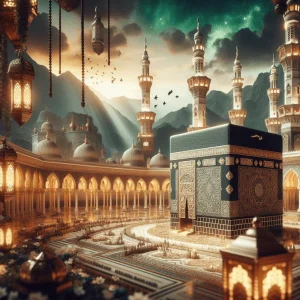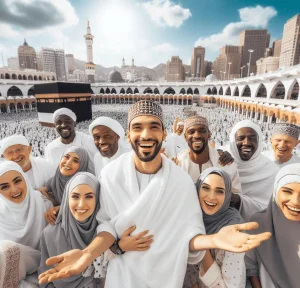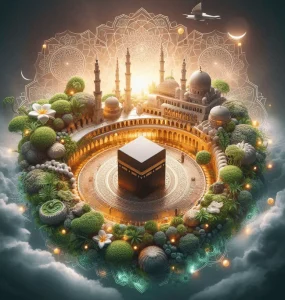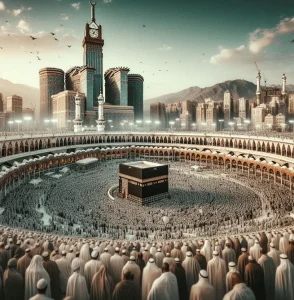Table of Contents
Islamic Calendar is a lunar calendar consisting of twelve months in a year of 354 or 355 days. This calendar is used by Muslims worldwide to determine the dates of religious observances, including Islamic Events that hold deep spiritual and cultural significance.

Understanding the Islamic Calendar
Lunar Basis
The Islamic Calendar is based on the lunar cycle, with each month starting upon the sighting of the new moon. This differs from the Gregorian calendar, which is solar-based. As a result, Islamic Events shift approximately ten to twelve days earlier each year in relation to the Gregorian calendar.
Hijri Years
The Islamic Calendar starts from the year of the Hijrah (migration) of the Prophet Muhammad from Mecca to Medina in 622 CE. This event marks a significant turning point in Islamic history and serves as the starting point of the Hijri calendar.
Months and Observances
Each month in the Islamic Calendar holds its own significance, with some months considered more sacred for fasting, prayer, and reflection. For example, Ramadan is the ninth month and is renowned for fasting from sunrise to sunset.
Major Islamic Events Throughout the Islamic Calendar
Ramadan
Ramadan is the most prominent month in the Islamic Calendar. It is a time of fasting, prayer, reflection, and community for Muslims worldwide. The fast begins at dawn (Fajr) and ends at sunset (Maghrib), with Iftar (breaking the fast) being a communal event.
Eid al-Fitr
Eid al-Fitr is celebrated at the end of Ramadan, marking the conclusion of fasting and a month of spiritual growth. It is a day of joyous gatherings, special prayers, feasting, and giving gifts to family and the less fortunate.
Hajj
Hajj is the annual pilgrimage to Mecca, one of the Five Pillars of Islam. It occurs in the twelfth month of the Islamic Calendar, known as Dhu al-Hijjah. Pilgrims perform rituals commemorating the actions of Prophet Ibrahim and Hajj is a profound spiritual journey for Muslims.
Eid al-Adha
Eid al-Adha, or the Festival of Sacrifice, follows Hajj and commemorates Prophet Ibrahim’s willingness to sacrifice his son Isma’il as an act of obedience to God. It involves the sacrifice of an animal and distribution of meat to family, friends, and the needy.
Mawlid al-Nabi
Mawlid al-Nabi celebrates the birth of Prophet Muhammad in the third month of the Islamic Calendar, Rabi’ al-Awwal. It is observed with prayers, recitations of poetry (Naat), and gatherings where the Prophet’s life and teachings are revered.
Laylat al-Qadr
Laylat al-Qadr, or the Night of Decree, falls in the last ten nights of Ramadan. It marks the night when the Quran was first revealed to Prophet Muhammad. Muslims engage in intense prayer and supplication, seeking divine blessings and forgiveness.
Cultural Significance of Islamic Events
Global Observance
Islamic Events are celebrated worldwide with diverse cultural expressions and traditions. Each region may have unique customs associated with Ramadan, Eid, and other significant occasions, reflecting the local cultural heritage of Muslim communities.
Community Unity
Islamic Events foster a sense of unity and solidarity among Muslims. Whether through communal prayers, charitable activities, or festive gatherings, these events strengthen bonds within the Muslim ummah (community) and emphasize shared values of compassion and generosity.
Spiritual Growth
Participating in Islamic Events promotes spiritual growth and mindfulness among Muslims. From the discipline of fasting during Ramadan to the acts of charity and pilgrimage during Eid and Hajj, these practices deepen one’s connection to faith and community.
Impact of Islamic Events on Society
Education and Awareness
Islamic Events provide opportunities for interfaith dialogue and cultural understanding. Public events, educational programs, and outreach initiatives during Ramadan and Eid promote awareness of Islam’s teachings and contributions to society.
Charitable Endeavors
Charity (Zakat and Sadaqah) is a cornerstone of Islamic Events like Ramadan and Eid. Muslims are encouraged to give generously to support the less fortunate, fostering compassion and addressing social inequalities.
Festive Celebrations
Islamic Events are marked by festive celebrations that span days of prayer, feasting, and community engagement. Decorations, special foods, and traditional attire add to the festive atmosphere, creating memorable experiences for families and communities.
Future of Islamic Events in a Global Context
Innovation and Adaptation
In an increasingly interconnected world, Islamic Events continue to evolve with digital platforms and social media enhancing global participation and connectivity. Virtual events and live broadcasts during Ramadan and Hajj allow Muslims worldwide to engage in rituals and prayers together.
Cultural Heritage Preservation
Efforts to preserve and promote the cultural heritage associated with Islamic Calendar are ongoing. Museums, exhibitions, and cultural festivals showcase Islamic art, architecture, and traditions, enriching global understanding of Muslim heritage.
Islamic Calendar
In conclusion, Islamic Events encompass a diverse array of religious observances and cultural celebrations that define the spiritual and communal life of Muslims. From the fasting of Ramadan to the pilgrimage of Hajj, these events reinforce faith, foster unity, and promote compassion within the global Muslim community. As Muslims continue to uphold these traditions while embracing modernity, Islamic Events remain integral to preserving heritage, promoting understanding, and nurturing spiritual growth worldwide.





More Stories
Tales of Wonder: Unraveling the Islamic Heritage Mystery
In the Footsteps of Greatness: Journeying Through Islamic Heritage Sites
Echoes of History: Rediscovering Islamic Heritage Around the World